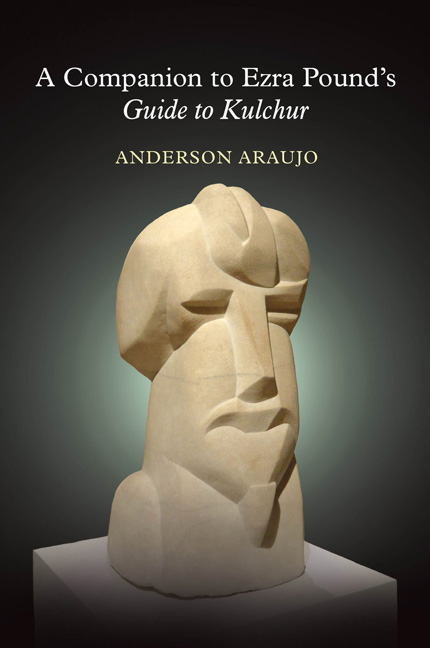Book contents
- Frontmatter
- Contents
- Acknowledgments
- Abbreviations
- Introduction
- Guide to Kulchur
- Part I
- Section I
- Section II
- Part II
- Section III
- 10 Guide
- 11 Italy
- 12 Aeschylus and . . .
- 13 Monumental
- Section IV
- Part III
- Section V
- Section VI
- Part IV
- Section VII
- Section VIII
- Section IV
- Part V
- Section X
- Section XI
- Part VI
- Section XII
- Section XIII
- Addenda: 1952
- Notes
- Index
13 - Monumental
from Section III
- Frontmatter
- Contents
- Acknowledgments
- Abbreviations
- Introduction
- Guide to Kulchur
- Part I
- Section I
- Section II
- Part II
- Section III
- 10 Guide
- 11 Italy
- 12 Aeschylus and . . .
- 13 Monumental
- Section IV
- Part III
- Section V
- Section VI
- Part IV
- Section VII
- Section VIII
- Section IV
- Part V
- Section X
- Section XI
- Part VI
- Section XII
- Section XIII
- Addenda: 1952
- Notes
- Index
Summary
Mr Joyce: James Joyce (1882–1941), Irish novelist, poet, and a towering figure in literary modernism. Pound first became acquainted with Joyce when Yeats suggested the young Irish writer's work for possible inclusion in the poetry anthology Pound was editing, Des Imagistes (1914). Joyce gave Pound permission to publish “I Hear an Army Charging upon the Land” and soon thereafter sent him a typescript of his groundbreaking collection of short stories Dubliners (1914) along with a chapter of his novel-in-progress, A Portrait of the Artist as a Young Man (1916). The two writers would only meet for the first time in June 1920 in Sirmione, Italy. Canto 76 chronicles the meeting, “recalling the arrival of Joyce et fils [his son, Giorgio] / at the haunt of Catullus” (76/476), the Roman poet whose country villa sat at the tip of the Sirmione peninsula on Lake Garda. In a 1918 essay Pound traces the seminal influence of Flaubert on Joyce and asserts that “there is nothing in life so beautiful that Joyce cannot touch it without profanation” and “nothing so sordid that he cannot treat it with his metallic exactitude.” In “Past History,” an essay published in The English Journal of May 1933, Pound acknowledges Yeats's “discovery” of Joyce, but lays claim to having helped get several of the latter's works into print, including the serialization of Ulysses in The Little Review. Pound would grow increasingly less sympathetic toward Joyce's work in the 1930s, particularly Finnegans Wake (1939). In the same essay, Pound opines that he cannot “see that Mr Joyce's later work concerns more than a few specialists” or that is greatly preoccupied with “the present.”
Sweet Christ … fadeless excrement: This bawdy bit of doggerel, which Pound sent to Eliot in an unpublished letter, was not meant for publication. The ellipsis in the original second line reads “fahrt,” a spelling Pound often used in his correspondence with Eliot.
“Ulysses”: The quintessentially modernist novel patterned after Homer's Odyssey, Joyce's Ulysses (1922) was serialized in twenty-three installments in The Little Review, from 1918 to 1920.
- Type
- Chapter
- Information
- A Companion to Ezra Pound's Guide to KulcherGuide to Kulcher, pp. 133 - 136Publisher: Liverpool University PressPrint publication year: 2018

